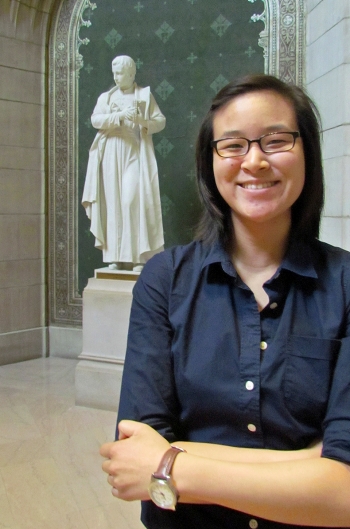
By
Narintohn Luangrath ’14 — whose family’s experiences as immigrants inspired her interest in migration and asylum policy issues — has won a Harry S. Truman Scholarship, which recognizes undergraduates who demonstrate leadership potential and the capacity to “make a difference.”
Truman Scholars are selected on the basis of a strong record of public service, as well as a policy proposal that addresses a particular issue in society. The scholarship provides funding support for graduate study.
While a Boston College student, Luangrath, an International Studies major from Tigard, Ore., has traveled to France to study media coverage of that country’s burqa ban, and interned for the Irish Human Rights Commission to provide research, analysis and recommendations for the Irish government on policies concerning refugees and asylum seekers.
She has served as an Undergraduate Research Fellow for Political Science faculty members Professor Peter Skerry and Associate Professor Jonathan Laurence, both eminent scholars in immigration issues, and Assistant Professor Jennifer Erickson, who studies international security.
These research opportunities have fueled Luangrath’s desire to advocate for reform in US policies toward refugees and persons seeking asylum.
“The plight of people who come to the US as forced migrants and refugees is often overlooked in mainstream debates about immigration,” she said. “This is a population at the mercy of a process that is not very transparent, and which often relies on prison detention or other detrimental practices.
“The US needs to balance its security concerns with a more effective, and humanitarian, policy toward forced migrants and asylum seekers.”
For Luangrath, the issue has a deeply personal connection. The experiences of her father, a native of Laos, and her mother, from Thailand, as well as other family members in immigrating to the United States made an indelible impression on her, and provided a signpost for her research interests.
“My parents had advantages other immigrants may have lacked, in that they came to the US on academic scholarships and obtained a college education,” she explained. “Although it wasn’t easy, even with a good fluency in English, they were able to integrate into American society quite well. But other family members, many of whom were refugees from the Vietnam War, had a far more difficult time resettling.
“So, I found myself becoming more and more interested in these conflicting immigrant narratives, and what was behind them. Doing the research project in France on the burqa controversy — which provided insights into how a Western society integrates an immigrant population — and then working with the Irish Human Rights Commission — and seeing how the state deals with the ‘Travelers,’ a nomadic population — were incredibly valuable experiences.
“Being able to do research with professors Laurence, Skerry and Erickson — who have been so generous with their time and advice — also has helped me learn more about the various social and political aspects related to migration and asylum policy issues.”
Luangrath says the process of applying for the Truman, which includes a written application and policy proposal as well as an interview, has further benefited her.
“What I learned is, you can be passionate about a policy issue, but you have to understand the costs, the ramifications, the related topics — you have to see the bigger picture. How might people respond to the policy? What are the competing policy interests? That way, you’re better prepared to think and reason about your issue.”
Skerry praised Luangrath as “a very impressive young woman who has continually taken the initiative in her education, whether showing up at my door asking to do research or obtaining funding through Advanced Study Grants and other sources to support her work abroad. She is a serious and dedicated student who is always finding ways to build on her classroom experiences.”
At BC, Luangrath directed the BCTalks lecture series, which showcases the scholarly interests and achievements of undergraduates. A member of the University’s Shaw Leadership Program, Luangrath also has mentored Boston area high school debaters and volunteered through the Generation Citizen program to teach young people about the importance of participating in democracy.
Luangrath expressed thanks to Vice Provost for Undergraduate Affairs Donald Hafner, Associate Director of University Fellowships Jason Cavallari, Political Science faculty members Kenji Hayao and Jennifer Purnell, and Founders Professor in Theology James Keenan, SJ, for their assistance in the Truman application process, as well as Kuong Ly ’07, Aditya Ashok ’12 and Amanda Rothschild ’11.
“Boston College is a very supportive community,” said Luangrath, who will work this summer at Georgetown University’s Institute for the Study of International Migration, and plans doctoral studies after BC. “I feel fortunate to have had so many mentors and friends at BC, who have helped me find opportunities to grow intellectually, to learn more about social and global issues of concern to me — and the role one can play in effecting change.”
But it is to her parents whom Luangrath feels the most gratitude. “They have worked hard and given back to the community — my father, for example, worked for an Indochinese refugee center in Portland. They have always encouraged me to pursue that which interests me most, so they are very happy my doing so has led to a Truman Scholarship.”



